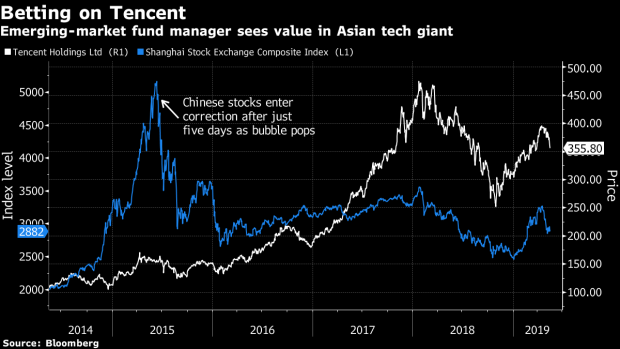May 17, 2019
Fund Manager Crushes Peers by Betting on Tencent and Alibaba
, Bloomberg News

(Bloomberg) -- Swedish investor Lisa Synning’s China bet is paying off.
The 41-year-old money manager’s Handelsbanken Tillvaxtmarknad fund trounced 99% of more than 250 emerging-market peers this year and 95% in the past five. She did so by pouring almost one-fifth of her cash into two companies: Tencent Holdings Ltd and Alibaba Group Holding Ltd.
“I’m not sure about China’s economy accelerating again, but I am fairly certain about Tencent and Alibaba growing,” Synning said in a phone interview from Stockholm. “People underestimate how much these companies can grow. They’re in that space where they will get even more profitable.”
Her bet on the Asian tech giants underscores a willingness to concentrate on a handful of high conviction long-term trades. Almost two-fifths of Synning’s $1.5 billion fund is invested in China, with another 10% in Brazil and 8% in India (Tillvaxtmarknad translates as emerging-market.) The money manager said she increased her exposure to Tencent and Alibaba in the past few years on optimism about growth in their financial units and a push from both firms to digitize brick-and-mortar stores.
The two Chinese companies are seeking ways to keep expanding as the world’s second-largest economy loses steam. Earlier this week, Tencent reported the slowest pace of sales growth since it went public in 2004 amid sluggish advertising and game revenue, which it’s trying to offset by making forays into new businesses. Alibaba, meanwhile, reported revenue and profit that beat estimates as its push into areas like cloud computing allows it to get better at understanding e-commerce customers and defy a slowing economy.
“They’re disrupting themselves,” Synning said. “Think about Apple when it disrupted the iPod with the iPhone. There were a lot of questions in the market, but that was a big success. Everything Tencent and Alibaba are developing for the future is underestimated.”
Synning’s confidence doesn’t extend to the whole industry. She recently trimmed her exposure to other hardware and technology firms, especially in South Korea and Taiwan, amid concern about rising tensions between Washington and Beijing. Meantime, India would be a place where Synning may add positions on the backdrop of a trade war and Prime Minister Narendra Modi’s re-election.
Her biggest fear is that the U.S.-China dispute drives inflation higher, slowing growth in the world’s top economies and forcing the Federal Reserve to hike rates. But that scenario threatens U.S. stocks more than developing-world assets, which have already priced in much of the pessimism, she said.
“International investors have been worrying about the trade war for a year, but people have been less worried about it hitting the U.S.,” Synning said. “I’m not so sure emerging markets would get hurt the most.”
To contact the reporter on this story: Ben Bartenstein in New York at bbartenstei3@bloomberg.net
To contact the editors responsible for this story: Julia Leite at jleite3@bloomberg.net, Alec D.B. McCabe
©2019 Bloomberg L.P.






